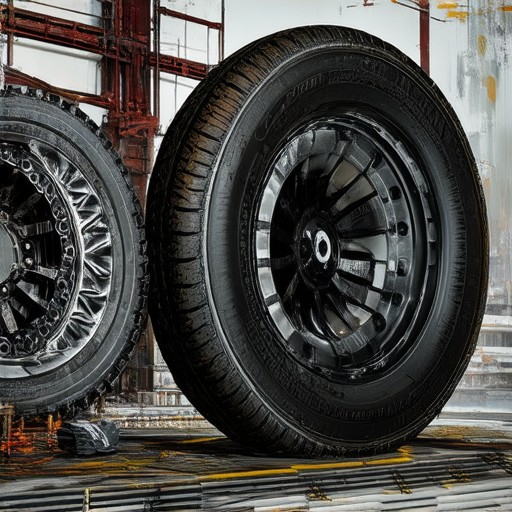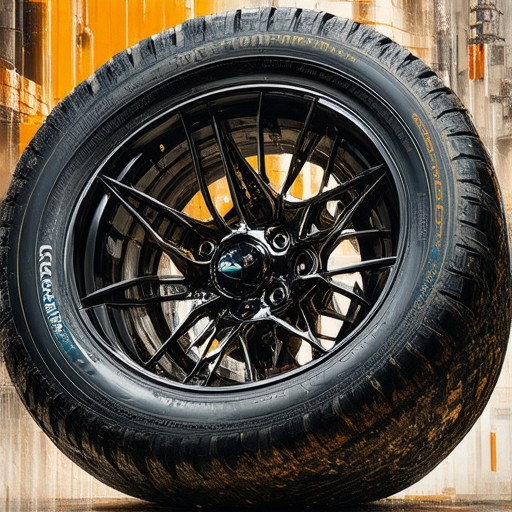When it comes to vehicle performance and longevity, few components are as critical as tire and wheel durability. Ensuring your tires and wheels are built to last not only enhances your driving experience but also safeguards your investment in your vehicle. Whether you’re a casual driver or someone who relies on their car for work, understanding how to extend the lifespan of your tires and wheels is essential for optimizing performance and safety. From exploring the factors that influence tire and wheel longevity to discovering the best practices for maintenance, this guide offers valuable insights to help you make informed decisions about your vehicle’s care. By prioritizing durability, you can enjoy a smoother ride, improved handling, and peace of mind on the road.
Key Takeaways
– Wheel Lifespan: Most wheels last between 6 to 12 years, varying by type and usage.
– Factors Influencing Lifespan: Usage, environmental conditions, maintenance, and weight/load play significant roles in determining durability.
– Signs of Wear: Look for cracks, dents, or uneven tread; these indicate it’s time for replacement.
– Maintenance Matters: Regular inspections and rotations can extend wheel life by preventing premature wear.
– Choosing Quality: Invest in high-quality wheels for better performance and longevity, whether alloy, steel, or custom rims.
– When to Replace: Prioritize replacement if wheels show signs of fatigue, corrosion, or safety hazards.

Tire and Wheel Protection: A Comprehensive Evaluation
Deciding whether to purchase tire and wheel protection involves evaluating several factors to determine its value for your specific needs.
Pros of Tire and Wheel Protection
- Prevention of Flat Tires: Tire and wheel protection can significantly reduce the likelihood of experiencing a flat tire, minimizing the risk of being stranded.
- Extended Tire Life: By protecting against road hazards, these products can extend the lifespan of your tires, saving you from frequent replacements.
- Improved Driving Safety: Safer tires often lead to better handling and braking performance, enhancing overall driving safety.
- Cost Efficiency: While initially costly, the long-term savings from reduced maintenance and extended tire life can offset the investment.
Cons of Tire and Wheel Protection
- High Initial Cost: The expense of purchasing tire and wheel protection can be a significant barrier for some drivers.
- Mixed Effectiveness: Results can vary depending on the type of protection, road conditions, and individual driving habits.
- Maintenance Requirements: Some protections may require regular checks or maintenance, adding to the overall effort required to maintain your vehicle.
- Durability Concerns: The lifespan of the protection can vary, potentially leading to frequent replacements if they wear out quickly.
Considerations for Purchase
- Type of Protection Needed: Choose based on driving conditions, such as rough roads or heavy debris, to maximize effectiveness.
- Maintenance Needs: Evaluate whether the protection requires ongoing care and how that fits into your routine.
- Durability and Lifespan: Look for products designed to last the life of your tires to ensure long-term benefits.
- Real-World Feedback: Research reviews and testimonials to gauge the effectiveness in actual usage scenarios.
- Provider Comparison: Compare offerings from various providers, considering features, pricing, and customer feedback to identify the best fit.
Conclusion
Tire and wheel protection offers notable benefits, particularly for those seeking peace of mind and longevity for their vehicle’s components. While the upfront cost may be daunting, the potential savings in terms of reduced flats, extended tire life, and improved safety make it a worthwhile consideration for many drivers. Carefully assessing personal needs and preferences, along with thorough research into available options, will help determine if this investment aligns with your priorities and budget.
How Long Do Tire Wheels Last?
Tire lifespan varies depending on several factors, including manufacturer recommendations, driving habits, and road conditions. Here’s a breakdown of key considerations:
- Manufacturer Recommendations :
- Vehicle manufacturers typically recommend tire replacement every 6 years, regardless of tread depth.
- Tire manufacturers often extend their warranties to 6 years, aligning with these guidelines.
- Some tire companies advocate for a 10-year replacement interval, even if tires still have significant tread left.
- Driving Habits and Conditions :
- Aggressive driving, frequent highway speeds, or regular exposure to rough roads can wear tires down faster.
- Poor driving habits, such as hard braking or quick turns, may reduce tire lifespan.
- Environmental factors like salt, sand, or extreme temperatures can also affect tire durability.
- Tips for Extending Tire Life :
- Regularly inspect tires for signs of wear, such as uneven tread patterns or cracks.
- Maintain proper inflation levels to prevent stress on the tires.
- Avoid driving through deep water or mud, as this can damage the tire casing.
- Replace tires at the recommended intervals to prevent further deterioration.
For the best results, always refer to your vehicle’s owner manual or consult with a trusted mechanic for personalized advice. At Incubus Wheels , we understand the importance of reliable and durable tires, which is why we offer a variety of options tailored to meet your driving needs. Our selection includes high-quality tires designed for both on-road and off-road performance, ensuring you get the most out of your vehicle.

Durable Tires: Key Factors and Expectations
Tires are a critical component of any vehicle, and their durability plays a significant role in overall performance and safety. While no tire is indestructible, certain factors influence their longevity and reliability. Here’s a breakdown of what affects tire durability and what you can expect from them:
- Material Quality: High-quality tires are constructed using durable materials that resist wear and tear. Look for tires made from strong rubber compounds and reinforced structures.
- Construction Features: Tires with advanced constructions, such as beadlocks or steel belts, offer improved resistance to punctures and increased tread life.
- Tread Patterns: The tread design impacts how well the tire performs on different surfaces. Deep treads provide better grip and reduce wear, especially on rough roads.
- Rubber Compound: The rubber compound used in the tire affects its flexibility and heat resistance. A softer compound may wear faster, while a harder one can handle more abuse but may not last as long in all conditions.
- Size and Type: The size and type of tire (all-terrain, highway, etc.) are designed for specific purposes, influencing their durability in different scenarios.
- Load Capacity: Tires have a maximum load rating, exceeding which can lead to premature wear. Always ensure your tires can handle your vehicle’s weight, including cargo or passengers.
Factors Affecting Tire Wear:
- Driving Habits: Aggressive driving, frequent hard braking, or driving through poor road conditions can significantly shorten tire life.
- Maintenance: Proper tire care, including regular inspections, inflation checks, and timely rotations, extends tire lifespan.
- Environmental Conditions: Extreme temperatures, potholes, or debris on the road can all contribute to tire damage.
Choosing the Right Tires:
Invest in tires that match your driving style and vehicle needs. For off-road use, opt for rugged tires with deep treads and reinforced sidewalls. On-road tires focus on stability and fuel efficiency. Always refer to manufacturer recommendations for the best fit.
Expected Lifespan:
On average, tires may last between 20,000 to 50,000 miles, depending on usage. Regular maintenance and correct driving habits can maximize this span.
At Incubus Wheels, we understand the importance of reliable and durable tires. Our selection of custom wheels and tires is designed to meet the demands of various driving conditions, ensuring you get the most out of your vehicle. Explore our collection today and find the perfect fit for your needs!
- Custom Wheels Collection – Perfect for those seeking a unique look and enhanced performance.
- Tire Materials Guide – Learn about the differences in tire materials and their impact on durability.
- Maintenance Tips – Extend the life of your tires with proper care and routine checks.

How Long Are Wheels Supposed to Last?
Your wheels are a critical component of your vehicle, and their lifespan can vary based on several factors. At Incubus Wheels, we understand the importance of durability and performance, which is why we’ve compiled some key insights to help you determine when it’s time to replace your wheels.
Factors Affecting Wheel Lifespan
- Usage: Wheels designed for daily commuting may last longer than those used for off-roading or racing. Aggressive driving conditions can wear tires faster.
- Environmental Factors: Extreme temperatures, salt, and humidity can accelerate tire degradation, particularly in regions with harsh winter conditions.
- Maintenance: Proper care, including regular inspections and timely replacements of worn parts, can significantly extend the lifespan of your wheels.
- Weight and Load: Carrying heavy loads or towing frequently can increase tire wear, especially on lower-quality wheels.
Expected Lifespan
On average, most wheels last between 6 to 12 years under normal driving conditions. However, this can vary depending on the type of wheels you’re using:
- All-Steel Rims: These are highly durable and can last up to 15 years or more, ideal for vehicles that don’t require frequent wheel changes.
- Aluminum Rims: Lightweight and popular, these rims typically last 8 to 10 years, though they may show signs of wear in areas prone to potholes or curbs.
- Custom or Racing Wheels: Designed for performance, these may last less than 5 years due to stress from aggressive driving or track use.
Extending Wheel Life
- Rotate your tires regularly to distribute wear evenly.
- Inspect for signs of damage, such as bulges or cracks, and address issues promptly.
- Inflate your tires correctly according to manufacturer specifications to prevent uneven wear.
- Consider upgrading to high-quality wheels if you frequently drive in challenging conditions.
Competitor Overview
When choosing new wheels, consider options from reputable manufacturers like Alloy Wheels UK or specialized brands like Racing Wheels . Each brand offers unique benefits, so evaluate their durability, weight, and price point to find the best fit for your needs.
At Incubus Wheels, we prioritize quality and performance, ensuring our customers receive wheels that meet their expectations for both style and longevity. By understanding these factors, you can make informed decisions to keep your vehicle running smoothly for years to come.
How Often Should You Replace Tire Rims?
The general recommendation for replacing tire rims is every 8 to 10 years, depending on usage and driving conditions. Here’s a breakdown of factors to consider:
- Lifespan: Most rims last approximately 10 years under normal conditions. Harsh driving environments, such as frequent off-roading or exposure to salt, may reduce this lifespan.
- Signs of Wear: Look for deep scratches, dents, or warping. These indicators mean it’s time for a replacement.
- Corrosion: Regular inspection for rust or corrosion, especially in areas with high salt content or near coastal regions, is crucial.
- Aesthetic Preferences: While functionality is key, updating your rims can refresh your car’s appearance and match current styling trends.
- Vehicle Type: Heavier vehicles like trucks and SUVs may require more frequent replacements due to increased stress on the rims.
- Cost Considerations: Replacement costs can be high, so waiting until there’s a clear need ensures you’re making the replacement for the right reasons.
- Safety Factors: Prioritize replacing rims if they become unsafe, as this can compromise handling and control.
- Warranty Checks: Review manufacturer warranties to see if a replacement falls under coverage terms.
For high-quality options, consider Incubus Wheels , offering stylish and durable rims tailored to various vehicle types. Explore their collection to find the perfect fit for your needs. Don’t overlook competitors like Method Wheels or Forgestar , each bringing unique features to enhance your vehicle’s aesthetics and performance.
Regular inspections and maintenance can help extend the lifespan of your rims, ensuring they continue to perform safely and efficiently. Always consult a trusted professional for a comprehensive assessment before making a decision.

What is the Lifespan of a Wheel?
The lifespan of a wheel depends on several factors, including its material, usage, and maintenance.
Types of Wheels
There are primarily two types of wheels commonly used in vehicles: alloy wheels and steel wheels. Each has its own lifespan:
- Alloy Wheels: Typically last between 3 to 10 years, depending on driving conditions and maintenance.
- Steel Wheels: Often last longer, with a lifespan of 7 to 10 years under normal use.
- Rubber Wheels: Can wear out more quickly, often lasting around 5 to 7 years due to constant flexing and impact.
Factors Affecting Lifespan
Several factors influence how long a wheel will last:
- Driving Conditions: Harsh driving, frequent potholes, or rough terrain can reduce lifespan.
- Maintenance: Regular inspections and timely replacements can extend the life of your wheels.
- Weight Distribution: Uneven weight distribution can cause uneven wear and tear.
- Weather Conditions: Extreme temperatures or harsh weather can affect wheel materials.
When to Replace Wheels
Signs that it’s time to replace your wheels include:
- Cracks or fractures in the alloy or steel
- Bends or dents that affect the wheel’s balance
- Worn tread patterns or exposed rims
- Uneven wear on the tires
For the best results, always consult with professionals or refer to manufacturer guidelines. Visit our website for more details and recommendations.
Conclusion
Understanding the factors affecting wheel lifespan and monitoring their condition can help you make informed decisions about replacement. Keep your wheels in good shape to enjoy a safer and more reliable driving experience.




0 Comments